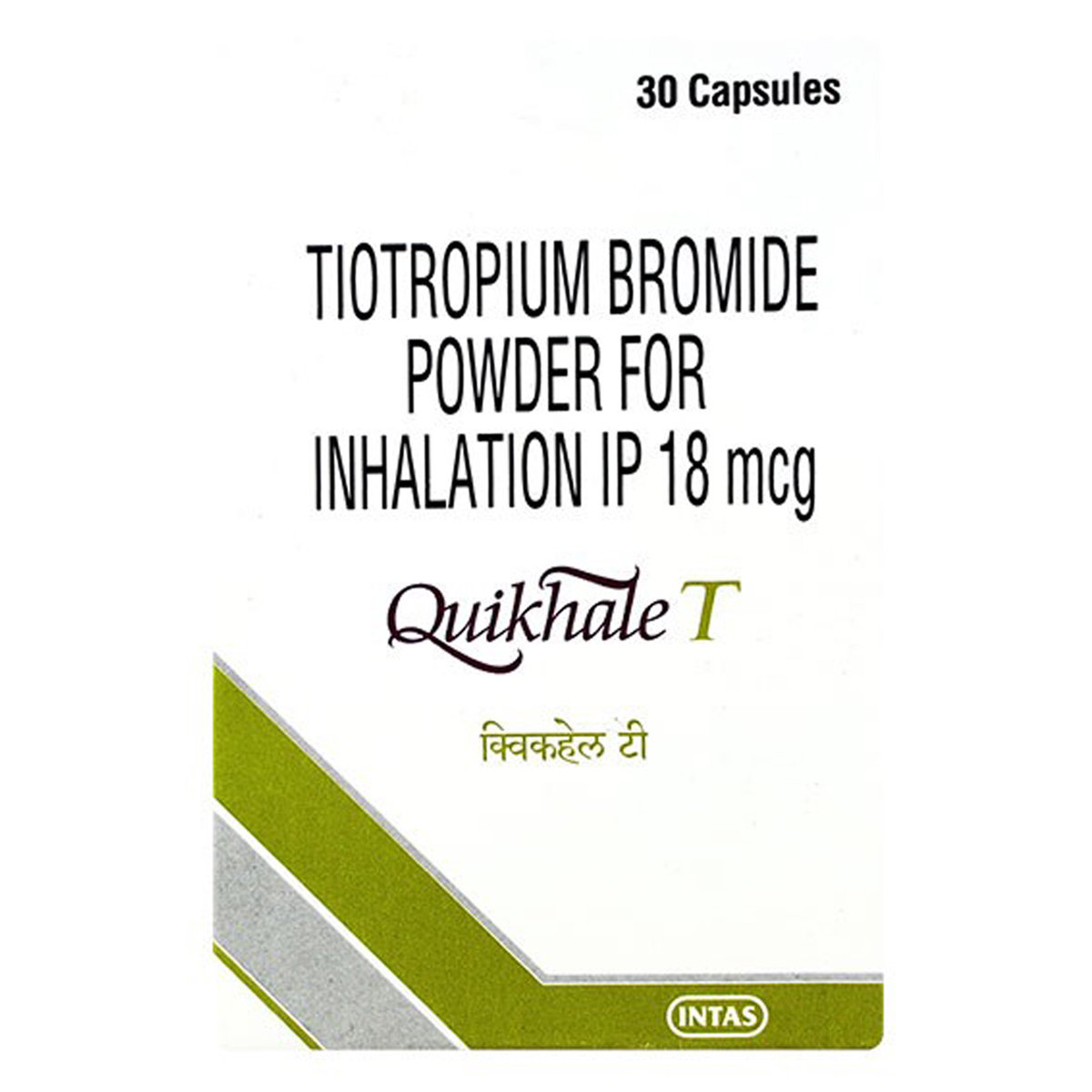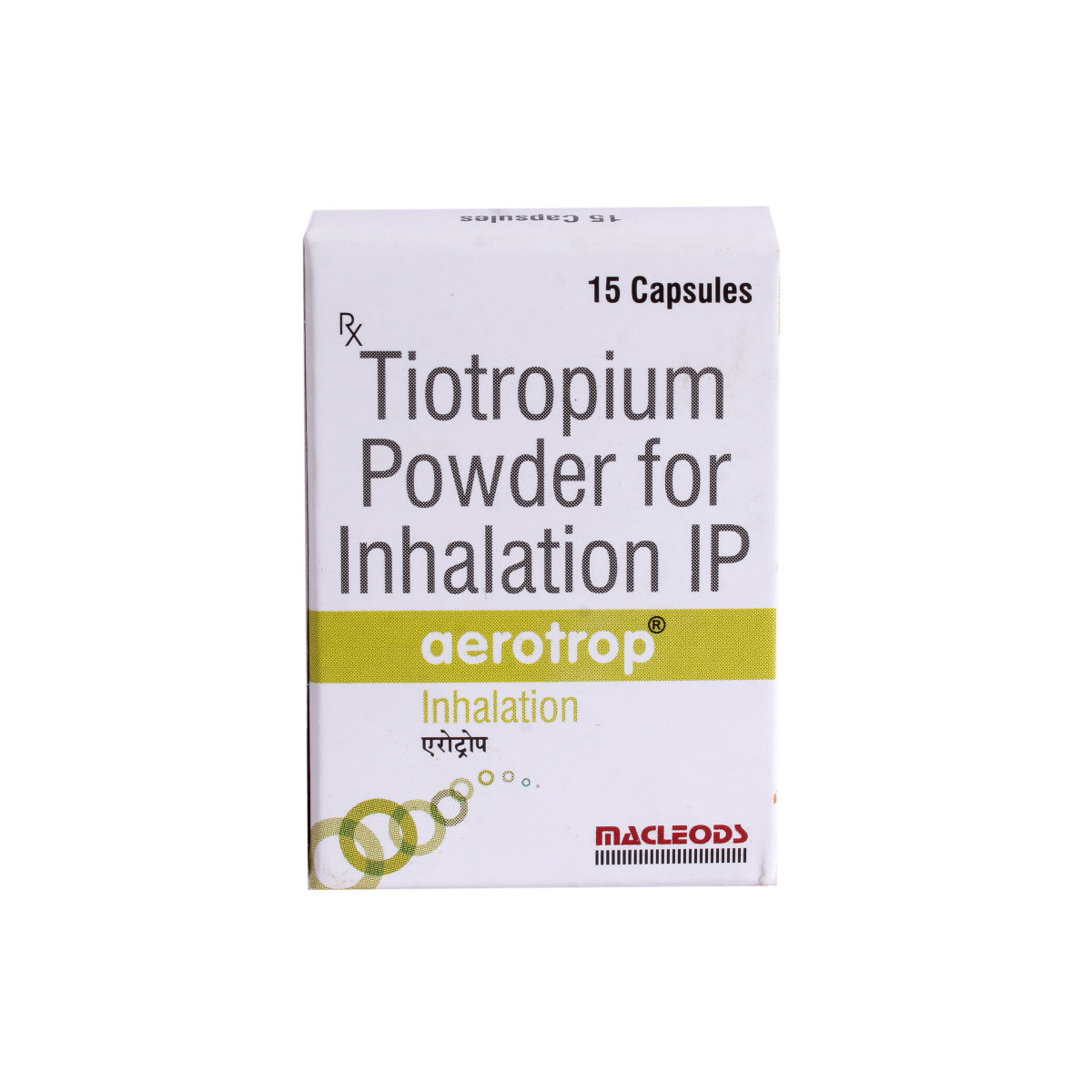Airtropium Capsule
MRP ₹152
(Inclusive of all Taxes)
₹22.8 Cashback (15%)
Provide Delivery Location
Online payment accepted
 Prescription drug
Prescription drugWhats That
Composition :
Manufacturer/Marketer :
Consume Type :
Return Policy :
About Airtropium Capsule
Airtropium Capsule belongs to the group of anti-asthmatic medicines called bronchodilators used to treat asthma and Chronic Obstructive Pulmonary Disease (COPD). Asthma is a chronic (long-term) respiratory condition in which airways narrow, swell and produce extra mucus, leading to difficulty breathing. COPD is a group of lung diseases with emphysema (shortness of breath) and chronic bronchitis (inflammation of the lining of bronchial tubes).
Airtropium Capsule contains ‘Tiotropium’ which works by blocking the receptors for acetylcholine which are released in the cholinergic nerve endings in the airways. Airtropium Capsule relaxes and widens the airway's openings, making it easier for the air to get in and out of the lungs. Thereby, provides relief from asthma and COPD.
Airtropium Capsule is meant for inhalation only; do not swallow Airtropium Capsule. You are advised to use Airtropium Capsule for as long as your doctor has prescribed it for you depending on your medical condition. In some cases, you may experience certain common side-effects such as dry mouth, stomach upset, constipation, blurred vision, chest pain and cold symptoms. Most of these side-effects do not require medical attention and will resolve gradually over time. However, you are advised to talk to your doctor if you experience these side-effects persistently.
Please do not stop taking Airtropium Capsule on your own as it might cause worsening of symptoms. Consult your doctor before taking Airtropium Capsule if you are pregnant or breastfeeding. Airtropium Capsule may cause dizziness, so drive with caution. Avoid consuming alcohol as it might cause increased dizziness. Airtropium Capsule is not recommended for children below 6years as the safety and effectiveness have not been established. Keep your doctor informed about your health condition and the medicines you are taking to avoid unpleasant side-effects.
Uses of Airtropium Capsule
Directions for Use
Key Benefits
Airtropium Capsule belongs to the group of anti-asthmatic medicines called bronchodilators used to treat asthma and Chronic Obstructive Pulmonary Disease (COPD). Airtropium Capsule works by blocking the receptors for acetylcholine which are released in the cholinergic nerve endings in the airways. Airtropium Capsule relaxes and widens the airway's openings, making it easier for the air to get in and out of the lungs. Thereby helps in treating asthma and COPD. Regular use of Airtropium Capsule can help with ongoing shortness of breath related to diseases like asthma. Daily use of Airtropium Capsule can also help prevent sudden, short-term worsening of COPD symptoms that might last for several days. Airtropium Capsule is also used as an adjunct to other medicines to treat asthma.
Storage
Drug Warnings
Do not use Airtropium Capsule if you are allergic to any of its contents. Inform your doctor before taking Airtropium Capsule if you have narrow-angle glaucoma, prostate problems or difficulty in urination, kidney, liver disease, cystic fibrosis, or have suffered from myocardial infarction (heart attack) during the last 6 months, irregular heartbeat or heart failure. Consult your doctor before using Airtropium Capsule if you are pregnant or breastfeeding. Airtropium Capsule may cause dizziness, so drive with caution. Avoid consuming alcohol as it might cause increased dizziness. Airtropium Capsule is not recommended for children below 6 years as safety and effectiveness have not been established. If wheezing or chest tightness worsens, please consult a doctor immediately. These might be signs indicating that your asthma is not controlled properly and requires an alternate or additional treatment.
Diet & Lifestyle Advise
- Eat a healthy diet and exercise regularly to strengthen your breathing muscles and boost your immune system.
- Avoid foods such as cabbage, beans, garlic, onions, shrimp, pickled food, dried fruits, fried foods, carbonated drinks, wine, bottled lemon and lime juice as it may worsen asthma symptoms.
- Do meditation, deep breathing, regular exercise and try progressive muscle relaxation techniques to relieve stress and reduce the risk of an asthma attack.
- Quit smoking as it may reduce the effectiveness of the Airtropium Capsule and irritate the lung, worsening breathing problems.
- Learn breathing exercises like pursed-lip breathing will help you move more air in and out of your lungs.
Side Effects of Airtropium Capsule
- Dry mouth
- Stomach upset
- Constipation
- Blurred vision
- Chest pain
- Cold symptoms
Habit Forming
Therapeutic Class
All Substitutes & Brand Comparisons
RX
Out of StockTioprl Dpicaps
Pristine Pearl Pharma Pvt Ltd
₹278
(₹8.34 per unit)
8% CHEAPERRX
Tioprl 18 Dpi Caps 30's
Pristine Pearl Pharma Pvt Ltd
₹300
(₹9.0 per unit)
1% CHEAPERRX
Out of StockPulmotrop Axacap
Axa Parenterals Ltd
₹152.71
(₹9.16 per unit)
Author Details
We provide you with authentic, trustworthy and relevant information
FAQs
Drug-Drug Interactions Checker List
- IPRATROPIUM
- OXITROPIUM
Special Advise
- You are advised to rinse your mouth with water after each dose of Airtropium Capsule because it not only removes the taste of medicine inhaled but also helps to avoid fungal infections in the mouth and throat. After rinsing your mouth thoroughly, you may drink water, milk or any liquids.
- Your doctor may advise regular lung function tests while on treatment with Airtropium Capsule.
- Your doctor may advise regular monitoring of electrolytes.
Disease/Condition Glossary
Asthma: It is a chronic (long-term) respiratory condition in which airways narrow, swell, and produce extra mucus, leading to difficulty breathing. The symptoms of asthma include wheezing (whistling sound while breathing), shortness of breath, chest tightness and cough, especially at night. The symptoms of mild persistent asthma may occur more than 2 times in a week and up to 4 nights in a month whereas, in case of severe persistent asthma, the symptoms occur several times every day and most nights. The treatment for asthma includes medication, breathing exercises and self-care.
Chronic Obstructive Pulmonary Disease (COPD): It is a group of lung diseases with emphysema (shortness of breath) and chronic bronchitis (inflammation of the lining of bronchial tubes). The major cause of COPD is smoking tobacco. Also, long-term exposure to fumes and chemicals may lead to COPD. The symptoms include chronic cough, shortness of breath or wheezing (whistle sound while breathing).

Have a query?
Alcohol
Safe if prescribed
You are advised not to consume alcohol while taking Airtropium Capsule as it might cause increased dizziness.
Pregnancy
Consult your doctor
Airtropium Capsule belongs to pregnancy category C. Please consult your doctor if you have any concerns regarding this, your doctor will prescribe only if the benefits outweigh the risks.
Breast Feeding
Consult your doctor
Consult your doctor before using Airtropium Capsule, your doctor will decide whether Airtropium Capsule can be taken by breastfeeding mothers or not.
Driving
Safe if prescribed
Airtropium Capsule may cause dizziness or blurred vision. Do not drive or operate machinery unless you are alert.
Liver
Consult your doctor
Dose adjustment may be needed. Please consult your doctor before using Airtropium Capsule if you have liver impairment/liver disease or any concerns regarding this.
Kidney
Consult your doctor
Dose adjustment may be needed. Please consult your doctor before using Airtropium Capsule if you have kidney impairment/kidney disease or any concerns regarding this.
Children
Safe if prescribed
Airtropium Capsule is not recommended for children below 6 years as the safety and effectiveness have not been established.









_0.jpg?tr=q-85)

